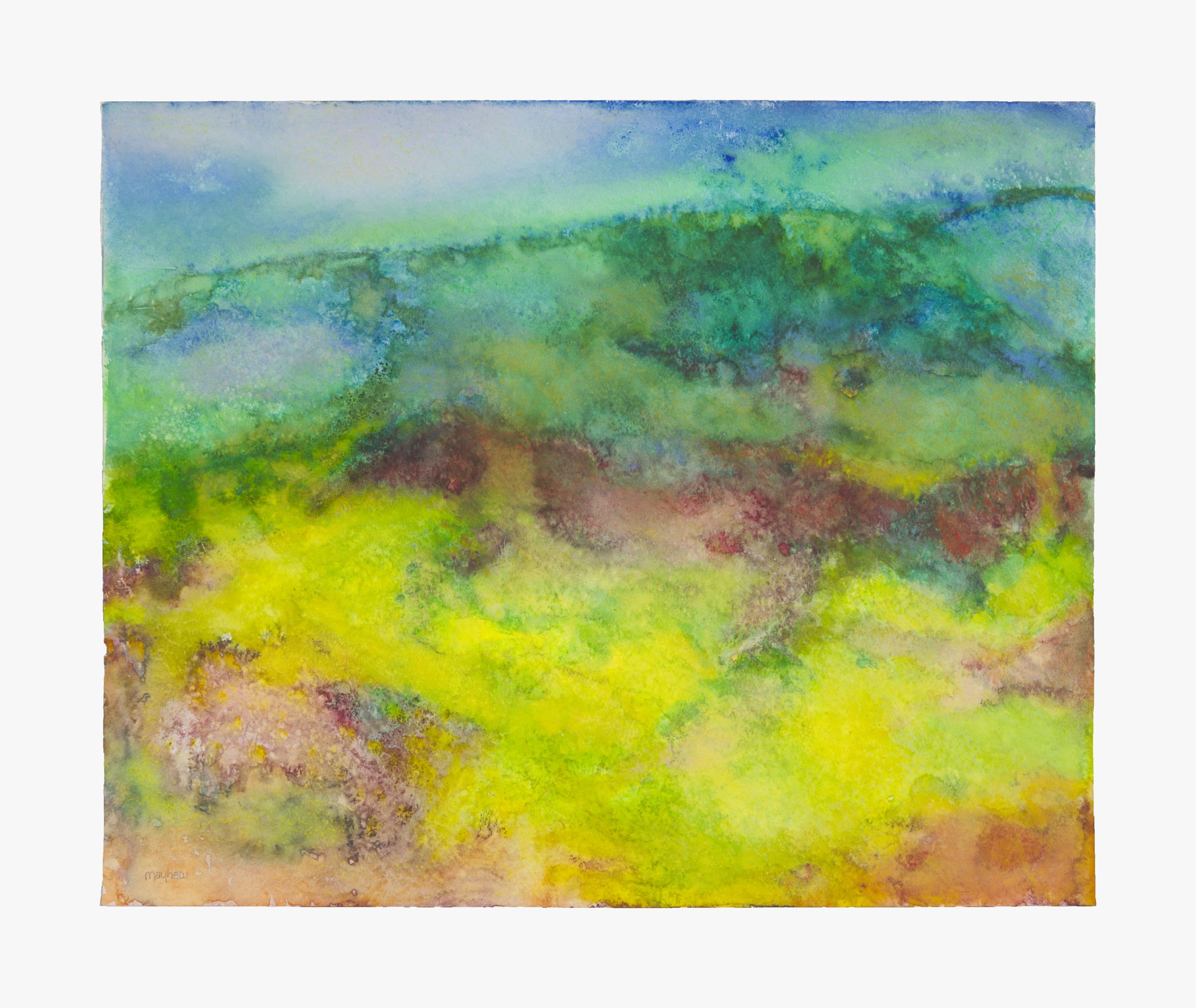The late artist Richard Mayhew anchored his century-long life to the place where water meets land. Born on Long Island’s South Shore in 1924, he passed away this past September in Soquel, California, on Monterey Bay’s northern shore. His luminous, color-saturated body of paintings, which he called “mindscapes,” fuse imagined landscapes and emotional terrains. Embedded with memory, they are meditations on his own and his Indigenous and African-American ancestors’ relationship to land.
A new gallery show at Venus Over Manhattan in New York City, Richard Mayhew: Watercolor, brings together 22 of the painter’s radiant and atmospheric paintings. Pulsing with eye-popping color, these works are rendered in the artist’s signature showstopping palette, which dances from moody earth tones to riotous, electric-sorbet shades (think: chartreuse, vermillion, lavender, mauve, magenta, and every shade of citrus). These works on paper showcase Mayhew’s singular command of color and his deftness in translating his creative vision across mediums, from slow-oxidizing oil paints — the material used in many of his most-exhibited paintings — to, here, the fast-drying immediacy of watercolors. Notably, most of these paintings (all but two) are being exhibited for the first time.
This exhibition, accompanied by a full-color exhibition catalogue, is a follow-up to Richard Mayhew: Natural Order, shown at the gallery last year, and the first show devoted solely to the artist’s watercolors in about two decades. This month marks another milestone for Mayhew’s watercolors: The Museum of Modern Art in New York City confirmed that it acquired its first painting by the artist, a watercolor and pastel piece titled “Monterey Blues Series V” (1994), which was displayed in Natural Order. The nearly two dozen watercolors on display in this new show span roughly the last third of Mayhew’s life, from 1990 through 2024.

As it turned out, this is also the last show the artist had a hand in planning. According to the gallery, Mayhew personally picked out each piece, arranging the selection in his garage, and painted new works expressly for this presentation during what turned out to be the final months of his life. Watercolor, therefore, also serves as the first posthumous exhibition of Mayhew’s art, a poignant tribute to his artistic legacy.
Communing with Mayhew’s late-in-life creative labors at this moment in time was deeply moving. When I heard about the artist’s passing, I happened to be visiting California. Reflecting on my conversation with him for a 2020 profile and remembering the joyous way he had burst into song mid-interview, I bee-lined to SFMOMA to be in the presence of his art, as an act of remembrance. Standing before the glowing forest scene rendered in oil in “Nyack” (1975), knowing Mayhew was no longer among the living, I felt a renewed and visceral understanding of the spiritual layers of his work. My eyes followed the painting’s rust-orange path through a field towards a patch of light beyond the treeline, as if following a path from one side of life to the other. Back in New York, the fresh white walls and quiet calm of the gallery space took on a similarly hallowed aura, like an art chapel.
With its selection of vivid, dreamlike paintings, the exhibition doubles as a tender space for observing, for remembering and celebrating life, for tapping into an intangible creative current that surges forward even beyond the artist’s lifespan. Let the colors zing your retinas. Watch the paints bleed together. Inspect the edges of the paper and see if you can tell which three pieces contain a secret painting hidden on the back side. Follow the horizons and zagging slopes, and find solace among clusters of cumulus trees. Drift among the warm, ethereal haze and the morphing shapes, the places where the natural imagery blurs, as in “Time Space — No. 6” (2003) and “S.E.S.S.” (undated). In these paintings, water becomes sky becomes forest. Marvel at the crackly, sparkling textures of salt in those places where the artist dampened his paper with sediment-rich water from the Pacific Ocean and applied pigments — or, sometimes, sprinkled table salt atop still-glistening watercolor paint — inviting sea and earth to swirl together. You can get lost in these paintings, and find your way back home again, too.


Richard Mayhew: Watercolor continues at Venus Over Manhattan (39 Great Jones Street, Noho, Manhattan), through January 18, 2025. The exhibition was organized by the gallery.

